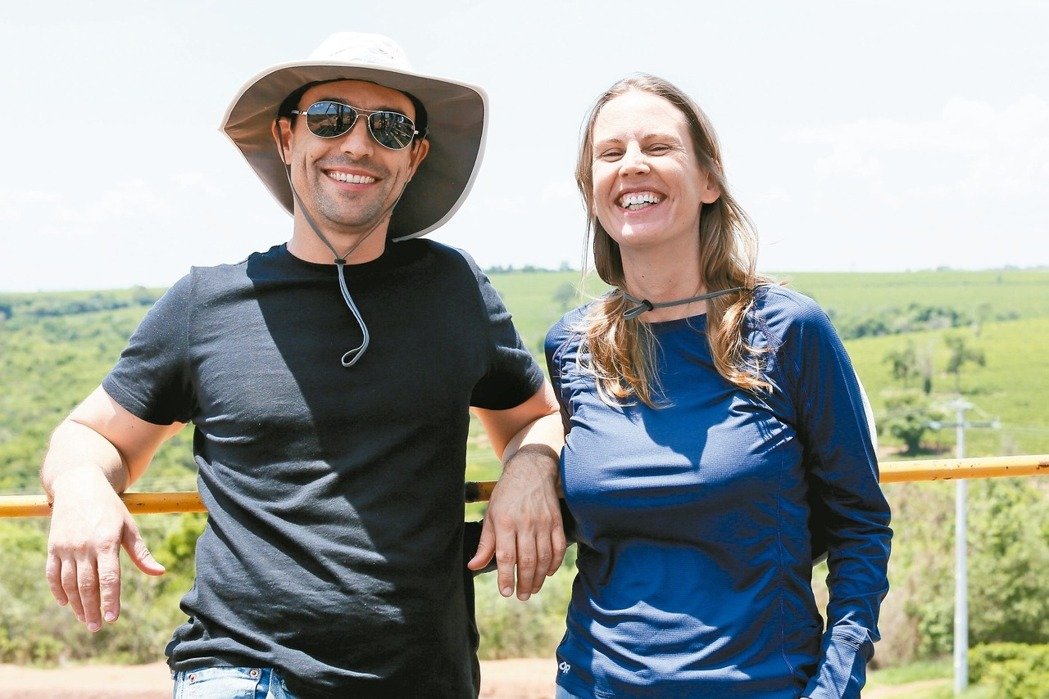Brazilian couples are not suitable for white-collar workers to grow coffee

Almerlin (right) and husband Siquila Reuters
The struggle story of the Brazilian couple may be written into a Hollywood screenplay.
Juliana Armelin and her husband, Paulo Siqueira, decided to completely change their lives in 2010 when they both quit their top white-collar jobs in S ã o Paulo and moved to a country farm seven hours from the city to start their second career, ─, growing coffee.
Seven years later, they beat many prestigious coffee farms and won Brazil's highest honor Coffee of the year Award for the second year in a row.
"I can't imagine that we can get there in such a short time," Siquila said in an interview with Reuters after receiving an award from the famous Italian coffee maker Illy.
Almerlin, the wife on the side, said: "I always say that we are not qualified enough in coffee, only a few pieces of hard work."
The couple met when they were in college. They both graduated from the engineering department of Brazil's top university, Sao Paulo University, and then went to the United States to study for an MBA at the Booth School of Business at the University of Chicago, and then returned to work in Sao Paulo.
Mr Almerlin worked at Mckinsey, a prominent business management consultancy, while Mr Siquila worked as a fund manager at Credit Suisse (Credit Suisse) and Vector, an investment firm.
They will start growing coffee beans because Almerlin's father wants to start producing coffee beans.
"I helped him with his research and fell in love with the idea," Almerlin said. We already had the idea of running a business together. "
After assessing the feasibility, they bought a farm in the coffee-growing region of Cerrado Mineiro, covering an area of nearly 210 hectares. "it was a dairy ranch, with only pasture," Siquila recalled. "
They planted their first coffee trees in 2011, harvested their first beans two years later, and had their first bumper harvest in 2015. A year later, they won the prize for the first time.
The farm uses state-of-the-art equipment, 100% irrigation and fully mechanized harvesting. "We have done a lot of research and asked a lot of experts who are good at producing high-quality coffee beans to do it the way they suggest," Almerlin said. Some people say we are idiots and want to grow coffee. We often say, 'Yes, we are'. "
They apply for government-guaranteed loans as much as possible to borrow money to buy all the equipment on the farm. Almerlin smiled and said, "the debt we owe will never be repaid in our lifetime." At present, 80% of the farm's output is exported, many of which are sold directly to boutique coffee merchants in the United States.
Nevertheless, the couple do not advise others to emulate them. "even if you have the money, it's really not easy," says Mr Almerlin. It takes a lot of effort to grow coffee. "
She also stressed that the two work closely together, she is responsible for financial management, and Siquila is in charge of managing the farm. But the two had no regrets. "We may grow coffee all our lives," she said. "
Important Notice :
前街咖啡 FrontStreet Coffee has moved to new addredd:
FrontStreet Coffee Address: 315,Donghua East Road,GuangZhou
Tel:020 38364473
- Prev

Coffee shop collection card "hit Trump on the forehead" was blasted
The customer card of the black blacksmith cafe in Pittsburgh, Pennsylvania, is printed with portraits of 10 conservatives, including President Donald Trump, who will make holes in the portrait's forehead, which looks like Trump was shot in the forehead and accused of inciting violence. Miller, the boss, said the card was designed to express disappointment with the system and had no intention of advocating violence. These 10 people include the deputy.
- Next

An introduction to coffee pretending
The word coffee comes from the Greek word kaweh, which means strength and enthusiasm. In Italy, people start the day with an espresso (Espresso) every morning. In Vienna, coffee, music and waltz are also called the three treasures of Vienna. Coffee has gradually become a culture and integrated into people's lives. Coffee may be as important to financiers as ordinary people need.
Related
- Can I make coffee a second time in an Italian hand-brewed mocha pot? Why can't coffee be brewed several times like tea leaves?
- Hand-brewed coffee flows with a knife and a tornado. How to brew it? What is the proportion of grinding water and water temperature divided into?
- What is the difference between Indonesian Sumatra Mantinin coffee and gold Mantinin? How to distinguish between real and fake golden Mantelin coffee?
- What does bypass mean in coffee? Why can hand-brewed coffee and water make it better?
- Unexpected! Ruixing Telunsu lattes use a smoothie machine to foam milk?!
- % Arabia's first store in Henan opens into the village?! Netizen: Thought it was P's
- Does an authentic standard mocha coffee recipe use chocolate sauce or powder? Mocha Latte/Dirty Coffee/Salty Mocha Coffee Recipe Share!
- What is the difference between Vietnam egg coffee and Norway egg coffee? Hand-brewed single product coffee filter paper filter cloth filter flat solution!
- What is the difference between sun-cured and honey-treated coffee? What are the differences in the flavor characteristics of sun-honey coffee?
- How to make Italian latte! How much milk does a standard latte use/what should the ratio of coffee to milk be?

